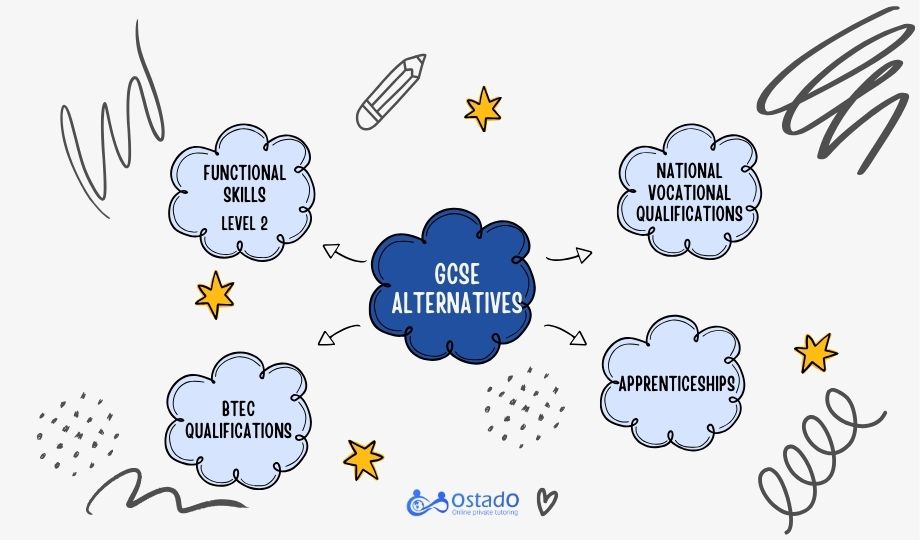Frustrated to start all over again? Believe it or not, retaking GCSEs is not necessarily a bad thing. First, resitting GCSEs shows you’re not a quitter, and second, it indicates that you understand the significant role of GCSE exams in higher education and career prospects.
Plus, when retaking GCSEs, you can benefit from your past experiences. Remember, your best teacher is your last mistake.
While it’s not possible to take the GCSE exams online, you can attend online GCSE courses to revise for the GCSE resits and get the desired grades.
GCSE Retakes: A Second Chance
GCSE retakes are your second (or further) chance to pass the GCSEs you failed. Failing the GCSE exams means that your GCSE grade is below 4.
The good news is that you don’t need to retake every exam. So, for example, if you fail GCSE history, you can try your chance in a Modern Foreign Language instead of resitting history. However, if you fail the compulsory GCSE subjects, you will have to resit them until you pass them or turn 18. Click to read more about resitting English language GCSE and resitting maths GCSE.
Preparing For The Exam
In the jungle of your thoughts, you might hear someone yelling, “what if you fail again?” To that voice reply “I will resit the exam again.” Your background experience with taking the GCSEs only makes you more prepared. So, do not worry about the GCSE resits much. There is virtually no limit to how many times you can resit the GCSEs.
- Now that you are determined to retake the GCSEs let’s take a look at the next steps.
- The first thing you should do is to look for the possible causes of your failure in the original exam. What were the most challenging topics? How much time did you spend revising them?
- You should come up with a realistic, practical and personalised plan. In the new plan, you should allocate more time to challenging topics and answer questions from past papers on the topic.
- Diversify your resources and take your learning style into account when choosing the materials and resources.
- Don’t wear yourself out. Keep studying until you lose focus. The Pomodoro technique is a popular study technique you can employ in your revision schedule.
You can also download free revision timetables to organise your tasks and targets and maximise the productivity of your revision plan.
Can I Retake a GCSE Online?
GCSE exams are given only in person, and you cannot take them any other way. However, there are online courses you can take to prepare for the exam.
|
Online GCSE Courses |
|
|
Platform |
Features |
| Open Study College | Flexible learning, personal tutor, study materials, online support |
| ICS Learn | Self-paced learning, tutor support, interactive lessons, variety of learning resources |
| National Extension College (NEC) | Flexible study schedules, tutor-marked assignments, comprehensive course materials |
| Oxford Open Learning | Personal tutor support, marked assignments, flexible learning |
| Cambridge Home School Online | Live online lessons, recorded sessions, personal feedback, exam preparation resources |
| My Online Schooling | Live classes, interactive lessons, experienced teachers, comprehensive study materials |
| CloudLearn | Self-paced learning, access to tutors, exam practice |
| Oxford Home Schooling | It offers various IGCSE homeschooling courses. |
Finding the Best GCSE Course for You
You can either choose traditional GCSE classes or online GCSE courses. If you prefer a more structured studying method, traditional GCSE classes are the best solution, but if you like more flexibility in your studying schedule, online courses are the better choice.
If you decide to take online courses, consider the following factors to choose the best course:
Reputation and Accreditation
Look for testimonials from students who have previously taken the course or, if available, read reviews of the course.
More importantly, the course must be recognised by exam boards like AQA or Edexcel. You can find out about the course accreditation in sections such as “About us” or “Course details.” You can also contact the course provider to make sure.
Compare Course Fees
You should compare the costs of the available courses. Some courses have added costs for materials, exam registration, and tutor support. Some courses provide discounts if you register for several courses. You should evaluate the costs and choose the most affordable online GCSE courses. You can also book a call to ask your questions.
Ask for Advice
Talk with your teachers, the school counsellor, or other students who have retaken the GCSEs through online courses. Explain your situation, needs, and goals and find out what they think about you participating in online GCSE courses.
Analyse the Course Features
- Course flexibility: This is especially important for students who have a part-time job or active social life. You should see if you can access the course at your convenience and follow it at your own pace.
- Content coverage: Find out the content that the course plans to cover. Does it cover the entire syllabus for each subject? Does it match the latest updates of exam board specifications?
- Additional resources: Look for additional resources, such as past papers, revision guides, and interactive tools. Using different resources maximises your preparedness for the exam.
- Access to a professional tutor: Another important feature of GCSE courses is access to a GCSE maths tutor. There will be times when you need more explanations to understand complex topics, such as Maths GCSE. The tutor can give you the support you need to learn the topics deeply. The main feature of online GCSE maths courses (or other subjects) is the flexibility they offer.
Soar Your Scores With Ostado’s Tutors
Ostado’s GCSE tutors can lead you one step closer to excelling in the GCSE exams. By the way, the first session is on us. Book a session with your preferred tutor to see if we can live up to your expectations. You’ll find our tutor’s expertise extensive and our tuition fees competitive. Our tutors can provide you with valuable guidelines on preparing for your GCSE resit exams.
Do I Have to Resit GCSEs?
Many post-16 education options, such as A-levels, vocational courses and apprenticeships, have entry requirements, and GCSEs are one of them. Additionally, some employers require GCSE qualifications, particularly in core subjects like English and Maths. Therefore, the GCSEs are the first serious step you take towards higher education and better career opportunities.
Another significance of GCSE retakes is that they can give you a second chance. Maybe something happened to you the night before the exam, you had an accident on your way to the exam centre, or you got sick for a while and couldn’t revise for the exam.
Finally, with background experience and familiarity with exam format and question styles, you have a better chance of getting higher grades than the original GCSE. Outperforming yourself boosts your confidence and motivates you to keep up the good work.
Alternatives to Resitting a GCSE
If, for any reason, you prefer not to take the GCSE exams, there are equally recognised qualifications you can acquire. These qualifications are easier to pass but they are accepted by universities and employers in the UK.

Functional Skills Level 2 Qualifications
Functional Skills Level 2 is equivalent to a GCSE pass (grades 4-9). The qualification is designed to develop practical skills in English, Maths, and Information and Communication Technology (ICT). Since Functional Skills qualification focuses on the development of practical skills directly applicable to real life, it’s less detailed and there less theory, which makes the qualification relatively easier than the GCSEs.
BTEC Qualifications
BTECs are vocational qualifications that involve more coursework and emphasise less on exams. BTECs cover both theory and practice and they can lead to further education or employment. A level-2 BTEC is equivalent to a pass in GCSEs.
National Vocational Qualifications (NVQs)
If you’re looking for a more hands-on experience, NVQs are one of your options. NVQs are work-based qualifications that assess your competency in doing a job and they are available in different various sectors and levels. NVQs are available in 5 levels, with level 2 being equal to GCSEs.
Apprenticeships
Apprenticeships are an excellent way to earn a qualification and earn some money on the side. Through apprenticeship, you’ll learn the necessary skills to do a job, which can lead directly to employment. In the end, if all goes right, you’ll earn a Functional Skills level 2 qualification as well as a job.
Booking and Sitting the Exam
Once you decide which GCSEs you want to resit and how you want to study for it, you should book the resit.
If you’re still enrolled in the school, it will take care of the resit. But if you’re not currently enrolled in a school, you must find an exam centre nearby where you can take the exam as a private candidate. The centre can be a school, college, or private exam centre.
Once you choose the exam centre, you can contact them to ensure they accept private candidates. If so, you can provide the required IDs, submit the registration forms, and pay the fees, and start preparing for the exam date. Let me repeat that even if you study online you must take the exam in person.
We have explained how you can retake maths gcse exams in another article but the process is applicable to other subjects as well. Click on the link to learn more about resit maths GCSE.
Key Takeaways on “Retake GCSE Exams”
- GCSE retakes are only possible in person.
- You can take an online course if you’re not comfortable with the classroom environment or need more flexibility.
- Traditional GCSE classes are better if you prefer a more structured learning environment.
- GCSEs are not the only way to further education or employment. You can pursue Functional Skills level 2, BTECs, NVQs, and apprenticeships as alternatives.
FAQs - Retake GCSE Online
- Can I resit my GCSE online?You can study in online GCSE courses but the GCSE exam is only resat in person.
- Can I resit my GCSEs at 30?There is no age limit for retaking the GCSEs and you can do it at the age of 30. Break a leg!
- Is it worth retaking GCSEs?GCSE qualifications play a substantial role in higher education, better career opportunities, higher incomes, and, ultimately, a better life. Therefore, it's definitely worth it to retake GCSEs.

